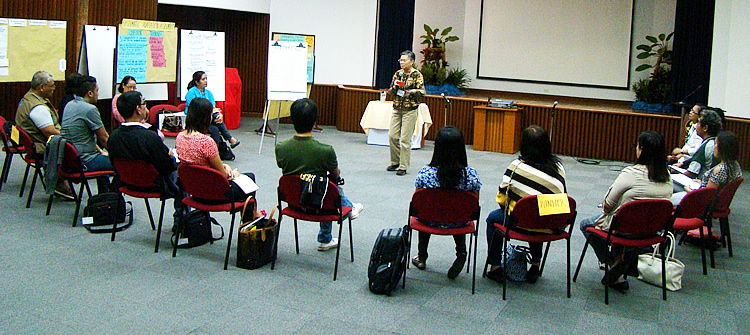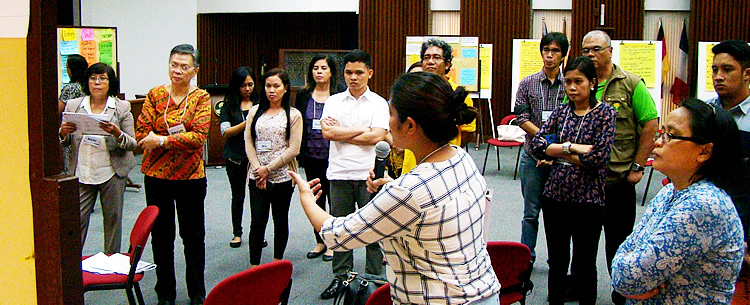The four-day training-workshop took place 20-23 October 2015, gathering 14 representatives from the DA-Adaptation and Mitigation Initiative in Agriculture (DA-AMIA) teams, DA regional field offices (DA-RFOs) and attached agencies and corporations. The activity—the second of its kind to be held this year—was designed to further SEARCA’s thrust of enhancing the capacity, awareness and understanding of DA offices on how to effectively and systematically integrate adaptation considerations into development policies, plans, and programs.
The activity specifically aimed to capacitate participants in understanding climate change impacts and the need to integrate climate change adaptation (CCA) into policies, action plans and project interventions in the agriculture sector; in identifying appropriate approaches for integrating CCA into policies, plans and programs at the national, regional, sectoral and project levels; and in applying these systematic planning steps to selected cases in agriculture, including its allied fisheries and forestry sectors towards developing flagship CCA initiatives.
In his welcome remarks, Dr. Gil C. Saguiguit Jr., who is now in his third term as SEARCA Director, underlined the importance of adaptation and heightened resiliency of the agriculture and fisheries sector as the ASEAN region’s best option against the negative effects of climate change, particularly on food security. He also said that the training-workshop is part of the center’s efforts in contributing to the country’s “collective quest to ensure available, nutritious, and safe food for all Filipinos” through the integration of climate change adaptation options into agriculture and fisheries policies, plans and investments.
Meanwhile, Dr. Alicia G. Ilaga, Director of DA’s Systems-Wide Climate Change Office (SWCCO) stressed in her message the need to address the worsening socioeconomic impacts of climate change through appropriate national policy instruments, especially in view of its intersections with the agriculture and fisheries sector and various cross-cutting issues such as poverty and food security.
Particularly tailored to form part of the capacity-building component of the DA AMIA Project 1 jointly implemented by SEARCA and the UPLB Foundation, Inc, the training-workshop adopted training modules that had been developed and widely-tested by the German Agency for International Cooperation (GIZ) based on the principles laid out in the Overseas Economic Cooperation and Development’s (OECD) Policy Guidance on Integrating Climate Change Adaptation into Development Co-operation.
For the said training-workshop, SEARCA adopted four of the ten core modules on the systematic approach to integrating climate change adaptation in development planning and applied the Harvard Case Method complemented by action learning exercises. Prior to this, SEARCA had also tailored and offered four previous runs of the module for the German-ASEAN program on Response to Climate Change and also for the Philippine agriculture and fishery councils, and DA AMIA project.
The training-workshop was enriched by an introductory lecture delivered by College of Arts and Sciences Dean and Professor Dr. Felino P. Lansigan on climate change and climate change adaptation, including concepts on the management of uncertainty in decision-making. In addition, Dr. Canesio D. Predo, Assistant Professor at the Institute of Renewable Natural Resources, College of Forestry and Natural Resources-UP Los Baños (CFNR-UPLB), provided an introduction to economic tools in assessing adaptation options during the third day of the workshop.
Near the end of the training-workshop, participants applied the systematic adaptation assessment to four real-life development projects culled from proposals they submitted prior to the actual event.
 CFNR-UPLB’s Department of Social Forestry and Forest Governance Professor Dr. Daylinda B. Cabanilla served as technical coordinator and facilitator throughout the duration of the training while Ms. Rosario B. Bantayan, SEARCA Program Specialist, served as the Co-Coordinator.
CFNR-UPLB’s Department of Social Forestry and Forest Governance Professor Dr. Daylinda B. Cabanilla served as technical coordinator and facilitator throughout the duration of the training while Ms. Rosario B. Bantayan, SEARCA Program Specialist, served as the Co-Coordinator.
Agencies, regional offices and attached agencies and corporations in attendance included the Bureau of Fisheries and Aquatic Resources-Regional Fisheries Office No. VII; Agricultural Training Institute; Bureau of Animal Industry; the RFOs of regions V, IX, X and XI; Philippine Center for Postharvest Development and Mechanization; Sugar Regulatory Administration; Philippine Carabao Center; and the Policy Research Service and Planning and Monitoring Service, both under the DA-Office of the Secretary.
A third rollout of the training-workshop under the DA-AMIA Project 1 will be held on 3-6 November 2015, which will then be followed by a training of trainers and facilitators on the last week of January 2016. (Christian Ray C. Buendia)
